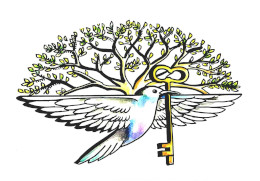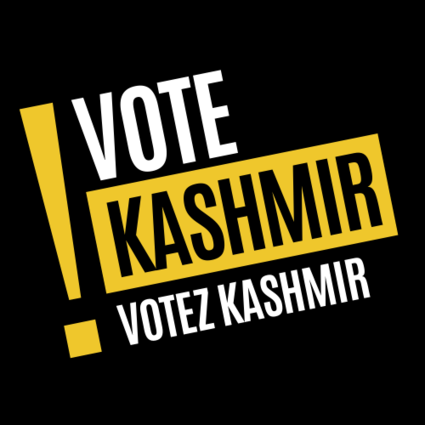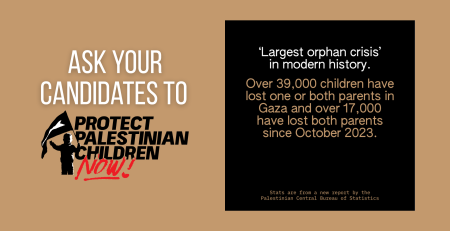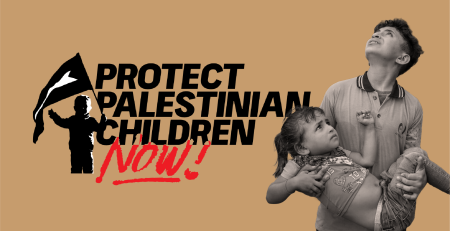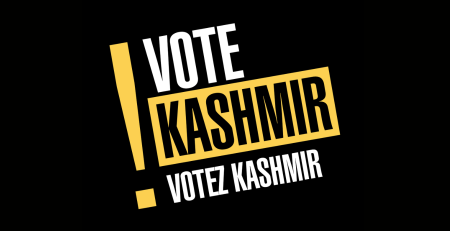le français suit
Join the growing movement of individuals and organizations who have endorsed the Vote Kashmir campaign, which calls for a human rights based approach on Canada’s policies on self-determination for Kashmir. Our grassroots campaign will ensure that political parties and candidates hear our calls for justice for Kashmir.
#VoteKashmir
also use #ItsOurVote, #CdnPoli, and #Elxn4. and #ElectPeace
Pledge for organizations and individuals to sign
It is important that parties and candidates in the upcoming scheduled Canadian election understand that:
● Jammu and Kashmir is internationally-recognized disputed territory;
● On March 31, 2020, amid the COVID-19 pandemic, the Indian government introduced the new domicile law. This law is aimed at demographic change, and at taking the land and resources from the indigenous population of Jammu and Kashmir;
● This law is counter to the United Nations Security Council resolutions 47 (1948), 91(1951), 96(1951), 98(1952), 122(1957) and 126(1957) that call for a plebiscite to determine the future of the disputed territory;
● Article 49 of the Fourth Geneva Convention states “the occupying power shall not transfer its own civilian population into territory it occupies;” and under Article 1 all High Contracting Parties, which includes Canada, are required to take action to ensure respect for the Convention “in all circumstances”; and
● The overall situation has dangerously worsened as India continues to move its own population into occupied Kashmir, confiscate land and resources, and oppose the rights of Kashmiris and silence resistance through repressive means.
In the upcoming Canadian general election scheduled for September 20, 2021 we commit to vote for candidates and parties that:
1- Condemn the government of India’s Domicile Law, and its settlement-colonization underway in Jammu and Kashmir
2- Request that India immediately restore full 4G internet access;
3- With urgency, especially given COVID-19 and the delta variant, request that India ends preemptive imprisonment and free all political prisoners;
4- Insist upon compliance with international legal obligations as part of Canada’s ongoing relationship with India, especially in trade, defense, and counterterrorism; and
5- Proactively work with the UN towards implementation of self-determination for the people of Jammu and Kashmir.
Questions you might ask canadidates running in your own riding:
1: Do you know what the Kashmir dispute is?
2: If elected, will you support the right of self determination of the people of Kashmir as per UN Security Council resolutions?
3: Would you like to get more information about the plight of the Kashmiri people?
You also can provide the information from the pledge, and the questions asked of their federal leaders
Find candiates in your riding
Elections Canada listing of candiates by riding
Full list of registered parties with Election Canada
Questionnaire for leaders of the federal parties
The following questions have been sent to each of the political party leadership asking them where they stand in regard to Canada’s foreign policy as it related to human rights and international law for the people of Kashmir. We will keep you posted on what we hear back.
1/ Do you support the principle of self-determination for the Kashmiri people afforded them through the plebiscite promised originally in United Nations Security Council resolutions 47 (1948) and in subsequent resolutions following? If so, what steps would you take if elected to show leadership to realizing the fulfillment of Resolution 47?
2/ Are you prepared to condemn the government of India’s Domicile Law, and its settlement-colonization underway in Jammu and Kashmir, and if so, what steps would you take to hold India accountable in this regard?
3/ What steps would you take to ensure India immediately restores 4G internet access and maintains this service?
4/ Especially in light of COVID-19 and variants including delta, are you prepared to request that India end preemptive imprisonment and free all political prisoners? What steps would you take to ensure the ICRC has assess to prisoners being held both within Indian Occupied Kashmir and in India, and to the prisoners’ families?
5/ What steps would you take to insist upon compliance with international legal obligations as part of Canada’s ongoing relationship with India, especially in trade, defense, and counterterrorism?Initiating organizations include: Just Peace Advocates, Justice for All, Friends of Kashmir Canada, Canadians for Justice and Peace
6/ What proactively work with the UN would you support Canada taking towards implementation of self-determination for the people of Jammu and Kashmir?
7/ What leadership would you be prepared to take in regard to combating islamophobia, and the labeling of those who speak up as human rights defenders as terrorists?
Initiating organizations include: Just Peace Advocates, Justice for All, Friends of Kashmir Canada, Canadians for Justice and Peace
Votez Kashmir
Engagement pour les organisations et les individus à signer
Cet engagement peut être signé par des individus et des organisations.
Il importe que les partis et les candidat·e·s inscrit·e·s aux prochaines élections fédérales canadiennes comprennent que :
- Le Jammu-et-Cachemire est un territoire contesté reconnu internationalement;
- Le 31 mars 2020, pendant la pandémie de COVID-19, le gouvernement de l’Inde a mis en œuvre la nouvelle loi sur le domicile, qui vise à modifier la composition démographique et à reprendre les terres et les ressources des peuples autochtones du Jammu-et-Cachemire;
- Cette loi va à l’encontre des résolutions 47(1948), 91(1951), 96(1951), 98(1952), 122(1957) et 126(1957) du Conseil de sécurité des Nations Unies, qui prévoient la tenue d’un plébiscite pour décider du sort du territoire contesté;
- L’article 49 de la quatrième Convention de Genève prévoit que « la puissance occupante ne pourra procéder à la déportation ou au transfert d’une partie de sa propre population civile dans le territoire occupé par elle », tandis que l’article 1 prévoit que toutes les hautes parties contractantes, incluant le Canada, s’engagent à faire respecter la Convention « en toutes circonstances »;
- Dans l’ensemble, la situation s’est aggravée dangereusement, étant donné que l’Inde continue de refuser de donner accès au réseau Internet 4G, privant ainsi la population de ses droits fondamentaux en matière d’expression, de communication et d’information, et que même les professionnel·le·s de la santé ne peuvent pas avoir accès aux renseignements dont ils ont besoin de toute urgence pour lutter contre la COVID-19.
À l’occasion des élections générales du Canada, prévues pour le 20 septembre 2021, nous nous engageons à voter pour des candidat·e·s et des partis qui :
- Dénonceront la loi sur le domicile adoptée par le gouvernement de l’Inde ainsi que l’entreprise de colonisation en cours au Jammu-et-Cachemire;
- Demanderont que le gouvernement de l’Inde rétablisse immédiatement l’accès au réseau Internet 4G;
- En toute urgence, compte tenu du danger que représente la COVID-19, demanderont au gouvernement de l’Inde de mettre fin à la pratique d’emprisonnement préventif et de libérer tous les prisonniers et prisonnières politiques;
- Insisteront pour que les obligations juridiques internationales soient respectées dans le cadre de la relation continue que le Canada entretient avec l’Inde, plus particulièrement dans les domaines du commerce, de la défense et de la lutte contre le terrorisme;
- Travailleront proactivement avec les Nations Unies pour mettre en œuvre l’autodétermination de la population du Jammu-et-Cachemire.
Questionnaire à l’intention des chefs des partis politiques fédéraux
- Soutenez-vous le principe d’autodétermination du peuple du Cachemire qui est garanti par le plébiscite promis dans le cadre de la résolution 47 du Conseil de sécurité des Nations Unies (1948) et les résolutions subséquentes? Si oui, quelles mesures prendrez-vous, si vous êtes élu·e, pour démontrer votre leadership dans la mise en œuvre de la résolution 47?
- Êtes-vous prêt·e à dénoncer la loi sur le domicile promulguée par le gouvernement de l’Inde ainsi que l’entreprise de colonisation en cours au Jammu-et-Cachemire, et si oui, quelles mesures prendrez-vous pour tenir le gouvernement de l’Inde responsable à cet égard?
- Quelles mesures prendrez-vous pour garantir que le gouvernement de l’Inde rétablisse immédiatement l’accès au réseau Internet 4G et maintienne ce service?
- Compte tenu de la pandémie de COVID-19 et de la progression du variant Delta, êtes-vous prêt·e à demander que le gouvernement de l’Inde mette fin à la pratique d’emprisonnement préventif et libère tous les prisonniers et prisonnières politiques? Quelles mesures prendrez-vous pour garantir que le CICR ait accès aux prisonniers et prisonnières qui sont détenu·e·s au Cachemire occupé et en Inde, ainsi qu’à leurs familles?
- Quelles mesures prendrez-vous pour faire respecter les obligations juridiques internationales dans le cadre de la relation continue que le Canada entretient avec l’Inde, plus particulièrement dans les domaines du commerce, de la défense et de la lutte contre le terrorisme?
- Quelles démarches proactives du gouvernement du Canada, en coopération avec l’ONU, soutiendriez-vous dans le but de mettre en œuvre l’autodétermination de la population du Jammu-et-Cachemire?
- Quelle forme de leadership êtes-vous prêt·e à assumer dans la lutte contre l’islamophobie et contre les tentatives d’assimilation des défenseurs et défenseuses des droits de la personne au terrorisme?
Organizations that have joined as endorsers to date include:
Canadians United Against Hate
Edmonton Small Press Assocoation
Regina Peace Council
Organization of Canadian Pakistanis
Let Kashmir Decide
knowledge track inc
Check out the Bloc Québécois response, and stay tuned for other responses.
Reponses from Candidates
New Democratic Party
Yavar Hameed, Ottawa West—Nepean
1/ Do you support the principle of self-determination for the Kashmiri people afforded them through the plebiscite promised originally in United Nations Security Council resolutions 47 (1948) and in subsequent resolutions following?
If so, what steps would you take if elected to show leadership to realizing the fulfillment of Resolution 47?
I support UNSC Resolution 47 and subsequent resolutions.
The NDP stands in solidarity with the people of Jammu and Kashmir and intends to use all available political platforms permissible under the Rule of Law and diplomatic means and ways to facilitate a peaceful resolution to this issue.
We will support efforts by Canada to:
- lead diplomatic efforts at the U.N. to de-escalate the situation in accordance with all relevant U.N. resolutions;
- mobilize the international community to bring relief to the victims of this humanitarian crisis;
- call upon the parties to enter into peace talks concerning Kashmir; and,
- establish a Special Parliamentary Committee to examine all aspects of the India-Pakistan relationship concerning Kashmir and Jammu, including but not limited to, consular, economic, legal, security and diplomatic relations.
2/ Are you prepared to condemn the government of India’s Domicile Law, and its settlement-colonization underway in Jammu and Kashmir, and if so, what steps would you take to hold India accountable in this regard?
Domicile and settlement colonization has caused immense hardship to the people of Jammu and Kashmir.
India’s Domicile Law reverses many of the withdrawal efforts included under UN Resolution 47.
I plan to leverage Canada’s relationship with India to uphold the Rule of Law and the fundamental human rights of the people of Jammu and Kashmir.
3/ What steps would you take to ensure India immediately restores 4G internet access and maintains this service?
While 4G internet service has been restored to Kashmir and Jammu as of February 2021, there is nothing to say that it won’t be shut down again.
The NDP wants to create a right to high speed internet for Canadians.
If internet services are ever shut down again in Jammu and Kashmir, we will urge the Government of India to restore it once more as we consider this to be a breach of basic rights.
We will also remind the Government of India of its previous public statements about encouraging investment, creating jobs and bringing the state on par with the rest of the country.
4/ Especially in light of COVID-19 and variants including delta, are you prepared to request that India end pre-emptive imprisonment and free all political prisoners?
What steps would you take to ensure the ICRC has access to prisoners being held both within Indian Occupied Kashmir and in India, and to the prisoners’ families?
The way in which India is applying its Unlawful Activities (Prevention) Act, 1967 directly contravenes the International Covenant on Civil and Political Rights.
As a human rights lawyer for the last twenty years, I condemn these inhumane actions against political prisoners.
I will remind the Government of India that political opposition is natural and to refrain from imprisoning the people of Jammu and Kashmir simply because they have different ideologies.
If those that are wrongfully imprisoned are not released, I will push for this issue to be addressed by the United Nations.
Whatever resolutions are put forward will need to be supported by a majority of countries to then place pressure on India to respect International Law, including applicable conventions, international human rights standards and the Rule of Law.
5/ What steps would you take to insist upon compliance with international legal obligations as part of Canada’s ongoing relationship with India, especially in trade, defense, and counterterrorism?
I will consider pushing for the use of sanctions if the situation worsens.
Similar to the NDP’s approach to all international affairs, if we learn that Canadian weapons are being used to oppress the people of Jammu and Kashmir, we will consider imposing a military embargo on India.
6/ What proactive work with the UN would you support Canada taking towards implementation of self-determination for the people of Jammu and Kashmir?
Canada needs to engage in substantial lobbying efforts with other countries through the UN.
We need to create a coalition of countries willing to hold India to account for its treatment of people in Jammu and Kashmir and to highlight the negative impacts of India’s actions taken against Jammu and Kashmir on its bilateral and multilateral relations.
I would also push the UN to reconsider its own approach to supporting self-determination.
The UN must identify tangible ways in which it can support unrecognized states that struggle to have existing border states recognize their right to self-determination.
The UN released a report in 2018 that exposes the atrocities the Indian government committed against the people of Jammu and Kashmir.
While this report sheds light on the issue, the UN lacks teeth and has failed to provide effective support to any unrecognized/ breakaway states in recent history.
We need international institutions that can act as leaders and that will demonstrate the power to hold states to account for their crimes against humanity.
7/ What leadership would you be prepared to take in regard to combating islamophobia, and the labeling of those who speak up as human rights defenders as terrorists?
As a multicultural country that is becoming increasingly diverse thanks to immigration, Canada is well-positioned to become a leader in the fight against Islamophobia.
The Government of Canada can engage in country-wide campaigns to educate and explain the differences between the teachings of Islam and terrorism. In these educational campaigns, we will explicitly consider the implications of the situation of Jammu and Kashmir and were possible integrate this in our assessment as it will have an impact on both Canadian foreign policy and our response to domestic terrorism within Canada.
Avneet Johal
Surrey-Newton NDP
Avneet does support the principle of self-determination for the Kashmiri people – and all people. Avneet has spoken many times about the problematic and dangerous nature of the Domicile Law. He chairs a reading group of which the recent focus has been the rise of authoritarianism around the world and steps that we can take to address these trends. Once again, we’re sorry this response is so brief and not reflective of how important this matter is. We look forward to further conversations in the future.
Surrey-Newton NDP Campaign Team
Kemal Ahmed
York Centre, NDP
Thank you for this great questionnaire. This is a very good cause and some things I haven’t fully researched , but I’ll do my best to answer.
- Regarding autonomy, this was our statement: https://www.ndp.ca/news/ndp-statement-status-human-rights-kashmir
- internet is a human right
- We believe the prison systems should not be
- we’re working on an online counter hate program to prevent terrorism
- As a Muslim, Islamophobia is very real. Human rights defenders should be allowed a voice to speak
Green Party of Canada
Felix Kongyuy
Surrey Centre, GPC
We ask you as a candidate where you in regard to Canada’s foreign policy as it relates to human rights and international law for the people of Kashmir.
1/ Do you support the principle of self-determination for the Kashmiri people afforded them through the plebiscite promised originally in United Nations Security Council resolutions 47 (1948) and in subsequent resolutions following? If so, what steps would you take if elected to show leadership to realizing the fulfillment of Resolution 47?
Yes, I will work with other parties in the parliament to ensure the UN opens the file in 1948, implement resolution 47
2/ Are you prepared to condemn the government of India’s Domicile Law, and its settlement-colonization underway in Jammu and Kashmir, and if so, what steps would you take to hold India accountable in this regard?
Yes, I will work with our partners to impose sanctions
3/ What steps would you take to ensure India immediately restores 4G internet access and maintains this service?
I will work with parliament to impose sanctions and call on other nations to support the Canadian action
4/ Especially in light of COVID-19 and variants including delta, are you prepared to request that India end preemptive imprisonment and free all political prisoners? What steps would you take to ensure the ICRC has access to prisoners being held both within Indian Occupied Kashmir and in India, and to the prisoners’ families?
Yes, it’s unacceptable to imprison opposition, and I will use the office to impose sanction. Also I will call for the release of political prisoners immediately.
5/ What steps would you take to insist upon compliance with international legal obligations as part of Canada’s ongoing relationship with India, especially in trade, defense, and counterterrorism?
Canada needs to rethink this partnership and comply with international standards, like some European Countries.
6/ What proactively work with the UN would you support Canada taking towards implementation of self-determination for the people of Jammu and Kashmir?
I will ask the foriegn ministry and the UN to immediately bring this issue up for debate in the UN, and ask other countries to support the self-determination for the people of Jammu and Kashmir.
7/ What leadership would you be prepared to take in regard to combating islamophobia, and the labeling of those who speak up as human rights defenders as terrorists?
I’ve been a victim of this type of labeling and one thing Canada needs to do is pass legislation for this type of hate and racism. I’ve been advocating for one in BC and we are working towards a legislation and if elected I will push for a national law, to combat racism, islamophobia and any form of hate.
I am an ally, count on my support.
